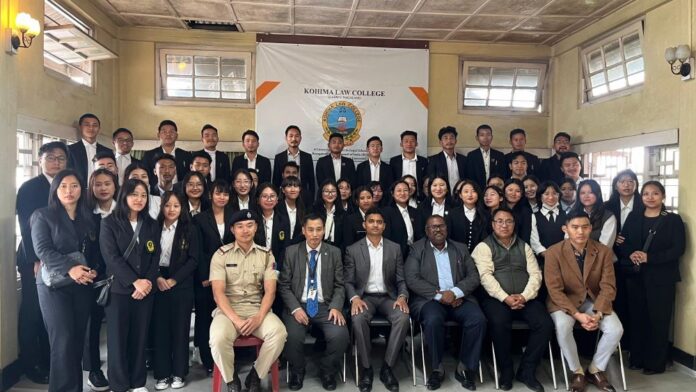Nagaland has embarked on a pioneering initiative to equip law students with a comprehensive understanding of the workings of the police department. This innovative program represents a paradigm shift in legal pedagogy, empowering future legal professionals with invaluable insights into law enforcement, criminal justice, and public service.
Nagaland, like many other states in India, grapples with a myriad of legal challenges ranging from crime and security concerns to human rights issues and governance deficits. Against this backdrop, the need for legal professionals who possess not only theoretical expertise but also practical acumen in navigating the complexities of law enforcement and criminal justice administration becomes increasingly apparent.
The decision to integrate knowledge of the police department into the curriculum of law students in Nagaland underscores a recognition of the symbiotic relationship between law enforcement and legal practice. By equipping aspiring lawyers with a nuanced understanding of police procedures, investigative techniques, and the dynamics of criminal investigations, the initiative seeks to foster a more holistic approach to legal education that transcends traditional classroom learning.
At its core, the program aims to instill in law students a deep appreciation for the role of law enforcement in upholding the rule of law, safeguarding public safety, and protecting the rights of citizens. By providing them with firsthand exposure to the challenges and dilemmas faced by police officers on the frontlines, the initiative seeks to cultivate empathy, professionalism, and ethical awareness among future legal practitioners.
Moreover, the integration of police department knowledge into legal education serves as a catalyst for interdisciplinary learning and collaboration. By breaking down the silos between legal studies and criminal justice, the program creates opportunities for students to engage with diverse perspectives, methodologies, and stakeholders involved in the administration of justice.
From gaining insights into the nuances of evidence collection and forensic analysis to understanding the intricacies of police interrogation and witness testimony, law students in Nagaland stand to benefit immensely from this interdisciplinary approach. Such practical exposure not only enhances their analytical and problem-solving skills but also equips them with the tools and competencies needed to navigate the complexities of real-world legal practice.
Furthermore, the initiative holds the potential to foster greater synergy between the legal profession and the police department, paving the way for more effective collaboration and communication between these key stakeholders in the criminal justice system. By fostering mutual understanding and respect, the program lays the groundwork for a more cohesive and responsive legal and law enforcement ecosystem in Nagaland.
However, the success of the initiative hinges on robust institutional support, adequate resources, and sustained commitment from all stakeholders involved. This includes collaboration between law schools, police academies, and government agencies to develop and implement a comprehensive curriculum that reflects the evolving needs and challenges of the legal and law enforcement sectors.
Additionally, efforts must be made to ensure that the program is inclusive and accessible to all students, regardless of their background or area of specialization. This may require the provision of scholarships, internships, and other forms of support to enable students from marginalized communities or disadvantaged backgrounds to participate fully in the program.
In addition, the decision to integrate knowledge of the police department into the curriculum of law students in Nagaland marks a significant milestone in legal education and criminal justice reform. By empowering future legal professionals with a comprehensive understanding of law enforcement, the initiative not only enriches their educational experience but also strengthens the foundations of a more just, equitable, and inclusive society. As Nagaland charts a course towards a brighter future, this innovative program serves as a beacon of hope for legal education and criminal justice reform across the country.



